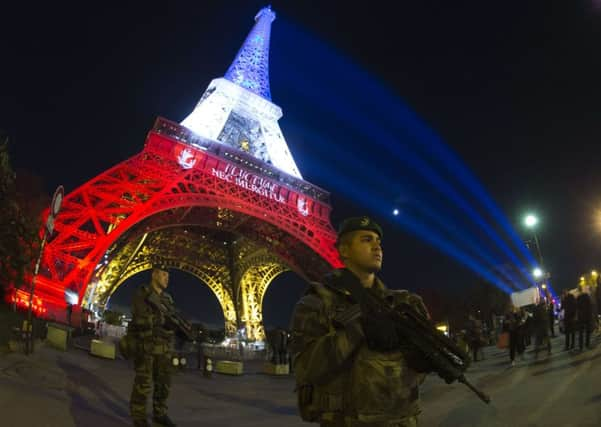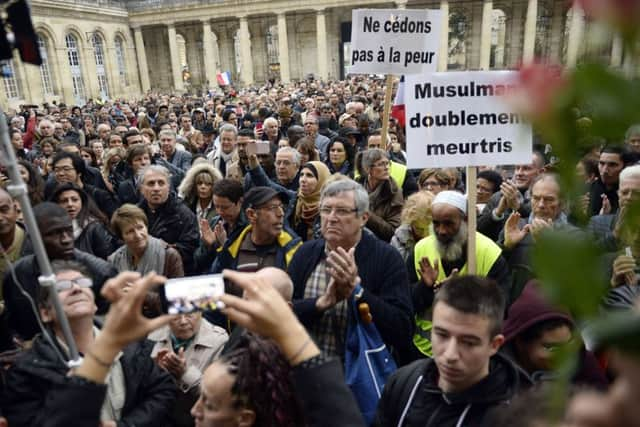Jane Bradley: Why we mourn for Paris over Pakistan


If I told you that a man in Bristol was run over in the street today, your eyes would glaze over. If I said it had happened in Glasgow, your ears might prick up. If I told you it had happened in your neighbourhood, in fact on the next street, you would be practically salivating for details.
“A man?” you might ask. “How old? What colour was the car? Did he have a dog with him? Could it have been that chap three doors down with the funny nose who mows his lawn on a Tuesday and wears a red jacket? I bet it was.”
Advertisement
Hide AdAdvertisement
Hide AdThese would almost certainly be the questions you would ask first – possibly even before what is arguably the most important: “And was he badly hurt?”


This doesn’t make you a bad person. It makes you human. And it is this human phenomenon which has led to the creation of the first rule of journalism, taught to every student of the craft the world over, which goes something like this: One hundred dead on the other side of the world equals 50 dead closer to home, equals ten dead somewhere in the UK, equals the man down the road breaking his leg.
This is not because journalists – or indeed readers – are heartless, this is human nature.
It is the natural human survival instinct. If something bad happens, the most obvious reaction is not empathy, but to wonder: “Could it happen to me? What if it had been my son walking along that road when the car skidded out of control? What if my husband had been coming home from work half an hour earlier?”
And indeed, the man with the funny nose and the red jacket could be you. He is you, save for a few metres of (well-mown) real estate.
Yet in the wake of the Paris attacks, the public appears to be wrestling with this natural instinct to connect to something which is familiar to them – and the desire to demonstrate some superior understanding of the situation on a global level. “This is not only happening in Paris!” people rage on social media. “Look at the dozens of people killed in Pakistan a couple of weeks ago. No-one cares!” No-one, the subtext goes, except me.
Many other columnists in the western press have this week pointed out that the claim that the media is “not reporting” on other atrocities around the world is bunk. Just plain wrong. This stuff is covered – extensively. And you could have seen it – you just didn’t bother to read it.
That the European readers who did see those articles, by and large, responded to the dreadful news with a fleeting thought of “Oh, how terrible” and got back to their daily business rather than holding all-night vigils, is, I would argue, the fault of those readers, not of the newspapers and websites reporting on the incident.
But I am not blaming you.
Advertisement
Hide AdAdvertisement
Hide AdHuman nature. It is human nature that people want to link something that is happening in the world back to their own experience. That is what makes the world go round: empathy; attempts to understand what other people are going through.
This is demonstrated by the phenomenon in the wake of last Friday’s attacks for people’s need to demonstrate their links, however small, to the city where the atrocity took place. The vast majority of UK news consumers will never have been to a Kenyan university campus, where 147 students were killed in an horrific gun attack in April this year, nor will know anyone who has been. Few will have even been to Africa, let alone Kenya. Therefore they cannot imagine themselves there, cannot put themselves in the shoes of those poor students whose lives were so viciously taken from them. Their lives, like the young people who died in Paris, cruelly snatched away.
The difference is that everyone has been to Paris. Scores of people of my acquaintance flocked to social media last Saturday morning to post a picture of themselves standing next to the Eiffel Tower, with captions along the lines of: “John and I in Paris seven years ago. Such a beautiful place. So sad about what is happening there.”
Others put out public messages of hope that a French exchange student they met 15 years ago, in the back room of a pub at the birthday party of a mutual friend, who may or may not now be living in Paris, is safe. Yes, of course they legitimately hope that their random acquaintance – and anyone else in the city for that matter – is safe, but actually, what they are really saying is: “I was once there. I once met someone who might have been there.” In short: “That could have been me.” This is not borne out of any form of racism, or any idea that life is worth less in Kenya or Pakistan than it is in France. Of course not. It is borne out of limited imagination. And human nature.
Author Douglas Kennedy, who lives in the 10th arrondissement of Paris, earlier this week wrote a long and eloquent Facebook tribute to the area where some of the terror attacks took place, an area he describes as “the best of Paris”.
He ends with a truth which could not have been put better: “It could have been you, it could have been me, it could have been our neighbours, our friends, our loved ones. We are all Parisians today.”
Kennedy is right. And of course the same should apply to those killed in Pakistan; Kenya; Syria; Lebanon. The people who died there had the same lost potential, the same family heartache, the same tragic tales of children left orphaned or maimed. Every single death is truly tragic.
Yet it is easier for most European readers of the news to “be” Parisian than it is for them to “be” Kenyan.
It is even easier to be Funny Nose Man.